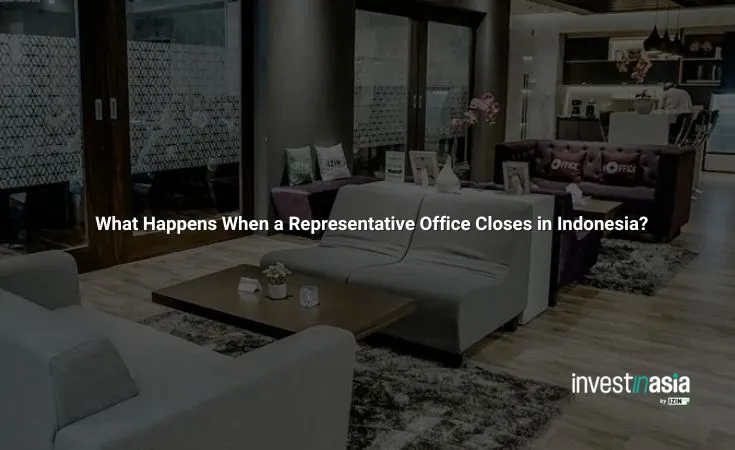When a Representative Office (KPPA) in Indonesia closes, the process is straightforward. Unlike limited liability companies, a KPPA does not require a complex liquidation process. Instead, the office simply submits a closure request through Indonesia’s OSS (Online Single Submission) system.
But while the administrative steps are simple, the closure marks a strategic inflection point for many foreign companies: should they exit, or take the next step and go commercial?
Understanding the Closure of a Representative Office


A Representative Office (KPPA) in Indonesia serves as a non-commercial setup, enabling foreign companies to operate locally for purposes such as research, brand promotion, and coordination, without engaging in revenue-generating activities.
Closure of representative offices may be necessary when:
- The representative office has completed its intended role in market analysis or research.
- The headquarters intends to transition into a fully operational commercial business.
- The validity period has ended with no intent to extend.
- Regulatory changes require restructuring.
Also read: How Long Can a Representative Office Operate in Indonesia?
Step-by-Step Closure Procedure
Closing a Representative Office involves:
- Preparing documents (including the head’s identity and closure statement from HQ).
- Submitting the closure form via OSS.
- Verification by BKPM (3 working days).
- Issuance of closure and NIB revocation letters.
- Revocation of NPWP (within 12 months for corporate entities).
- De-registration from BPJS (social security).
This administrative process is relatively simple compared to the dissolution of a PT (Perseroan Terbatas), which requires shareholder resolutions, court announcements, tax clearance, and liquidator reports.
What Happens After Closure?
Once the representative office is formally closed:
- The company no longer holds legal status in Indonesia.
- All tax obligations must be finalized.
- Business licenses and identification numbers are revoked.
- The parent company must cease all in-country operations under the KPPA name.
What Are Your Options Post-Closure?


For foreign companies intending to remain active in Indonesia, there are several strategic options beyond a representative office:
1. Establish a PT PMA (Foreign-Owned Company)
This is the most frequently chosen path for foreign companies seeking to conduct full-scale business activities in Indonesia.
Advantages:
- Full legal and commercial authority.
- Revenue generation and hiring capabilities.
- 100% foreign ownership in most open sectors.
Considerations:
- Minimum IDR 10 billion in investment (USD 1 million).
- Requires capital deposit and various permits.
Also read: How to Transition from a Representative Office to a PT PMA in Indonesia: InvestinAsia’s Guide
→ Learn more about PT PMA registration
2. Form a Joint Venture
Joint ventures allow foreign firms to partner with Indonesian entities, especially in sectors with foreign ownership caps.
Advantages:
- Leverage local market expertise.
- Navigate restricted sectors.
Best for: Industries like film, pharmaceuticals, and logistics where local majority ownership may be mandated.
Also read: 5 Advantages of Joint Ventures for Businesses
3. Set Up a New Business Entity
Sometimes, restructuring the business into a new form—such as a different type of representative office or limited liability company—can be the right move. Indonesia allows different rep office types, such as:
- KP3A (Foreign Trade Office)
- BUJKA (Construction)
- Power Sector Rep Offices
Also read; The Types of Companies and Business Entities in Indonesia
→ Explore company registration options with InvestinAsia
Closing Is a New Beginning
Closing a representative office in Indonesia is often a strategic decision that signals a new phase in a company’s regional growth. It’s not just the end of an administrative phase, but the start of a strategic shift. If your business is ready to go beyond market exploration and into revenue-generating operations, transitioning to a PT PMA is your next logical step.
InvestinAsia provides end-to-end support—from representative office closure to PT PMA registration, license acquisition, and local compliance. With deep regulatory expertise and fast turnaround, we’re your trusted partner in expanding operations in Indonesia.
👉 Transition to a PT PMA with InvestinAsia
FAQs
Which documents are required to officially close a representative office in Indonesia?
You’ll need the head office’s closure statement, NPWP, final reports, and internal appointment letters.
How long does the closure process take?
Initial verification takes up to 3 business days. It may take up to 12 months to fully revoke the NPWP (Tax Identification Number).
Do I need to pay tax after closure?
All pending tax responsibilities must be cleared before the NPWP can be cancelled.
Can a KPPA be extended?
Yes, under Regulation 13, KPPA permits can be extended beyond 5 years if justified by the parent office.
What’s the difference between KPPA and PT PMA?
A KPPA cannot engage in commercial activities, while a PT PMA is a full-fledged company with the right to generate revenue.



